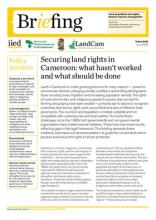Land Library
Welcome to the Land Portal Library. Explore our vast collection of open-access resources (over 74,000) including reports, journal articles, research papers, peer-reviewed publications, legal documents, videos and much more.
/ library resources
Showing items 1 through 9 of 9771.Au cours des trente dernières années, un nombre croissant d'États ont adopté de bonnes lois qui renforcent considérablement les droits fonciers de leurs citoyens.
The paper critically engages with sustainable development goal targets (SDG-2- Target 2.3; SDG-5) to examine how and why large-scale agricultural land acquisitions modify the social relations of women’s food access.
This policy brief provides details of the United Nations Special Rapporteur recommendations regarding how governments can upgrade informal settlements within a human rights-based framework.
Land in Cameroon is under growing pressure for many reasons — powerful commercial interests, changing climate conditions and shifting demographic flows including mass migration and increasing population density.
Despite an inflow of investment in rural communities, there are concerns about negative impacts on local people’s livelihoods, access to farming land, productivity, income levels, food security and access to social services.
The movement to secure women’s land rights in Senegal needs to take into account the rights of all sections of the targeted communities. Hence, the cases presented testify to specific situations along with evaluations of initiatives targeting improvement of women’s land rights.
This report summarizes the implementation activities, “policy intersections” and the subsequent production of a draft model Land Use Bill (LUB, 2018) for Nigeria.
Government intervention and local level coordination of large-scale investment decisions are important components required for positive impacts on food security, nutrition and livelihoods of host communities.
A new Model Land Use Bill is proposed to address the lapses identified in the Nigerian Land Use Act (LUA, 1978), such as poor administrative system for lands, ownership, and the absence of community participation.









